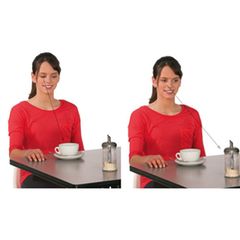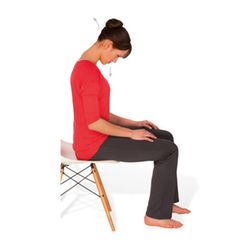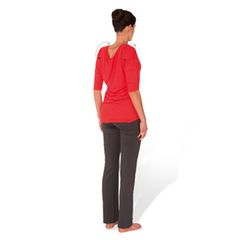Relaxed through the menopause: With these tips it works

by Antje Kunstmann
2 minsIt takes time for the hormonal changes during menopause to complete. Here are the best tips for getting through this time with ease.
Maintain a healthy diet – rarely eat meat, lots of vegetables and fruit, little animal fat, more fish, and low-fat dairy products. The threat of osteoporosis should be countered by consuming plenty of dairy products. And since the heart- and vascular-protective effect of estrogens decreases, you should pay particular attention to heart-protective fats such as flaxseed, rapeseed, or olive oil. Soy-containing foods such as tofu are good. The phytoestrogens they contain mitigate the declining production of the body's own hormones (read more: Nutrition during menopause ).
2. Avoid certain foodsThose suffering from hot flashes during menopause should be careful with alcohol, spicy spices and hot drinks: they dilate the blood vessels and thus increase sweating.
3. Take actionWomen who are inactive are three times more likely to experience hot flashes than women who are active. Endurance exercise (running, swimming, cycling), in particular, helps the body regulate temperature fluctuations better. Exercise also prevents osteoporosis and helps maintain weight when the body's energy needs decrease.
4. Relax consciouslyYoga and relaxation techniques such as breathing exercises reduce hot flashes and promote well-being. Yoga has a positive effect on the autonomic nervous system, reduces heart palpitations, and contributes to mental balance, as has now been confirmed by numerous studies.
Tip: Brazilian Dinah Rodrigues has developed a yoga program that activates the body's own hormone production and counteracts menopausal symptoms. Here, she presents the exercises for hormone yoga .

Is menopause causing you sleep deprivation, stress, mood swings, and weight fluctuations? Don't worry, you're not alone! In the BRIGITTE Academy online course, experienced experts will support you with concrete tips and exercises for your everyday life.




Those who go to the sauna regularly also cope better with hot flashes. Just like endurance sports, sauna use trains the body to better cope with temperature fluctuations.
6. Deal openly with hot flashesDon't try to hide your sweating. The stress of noticing will cause adrenaline to release, thus intensifying hot flashes.
7. Wait and seeMany menopausal symptoms, such as hot flashes, occur in phases. They are sometimes more intense, sometimes less intense. This is due to fluctuating hormone levels. So, there's a good chance that the problem will go away on its own after a few weeks; it's safe to wait and see before seeking treatment.
8. Have fun with sexBecause menstruation stops, along with the fear of pregnancy, many women experience a new, freer sexuality during or after menopause . However, the drop in hormones often leads to vaginal drierness, which can make intercourse uncomfortable or even painful. Lubricants can help!
By the way: Women who have regular sexual intercourse usually have fewer problems with vaginal dryness than women who only sleep with their partner occasionally.
9. If necessary: take hormonesSometimes it all gets too much: a bright red face and sweaty hair at a meeting, sweaty sheets and sleepless nights, stiff joints and aching muscles that make exercise impossible – then you should consider with your gynecologist whether hormones might not be the best solution for a limited period of time. The dose should be as low as possible. The goal is not to completely eliminate the hot flashes, but to make them bearable. Then you can still feel your body – and also know when you no longer need the hormones. Our article on hormone replacement therapy explains all the important details.
10. Stop taking the pillThose who take the contraceptive pill continuously cannot determine whether ovulation is still occurring and whether contraception is still necessary. At around age 40, the pill should be discontinued, as the risk of thrombosis and stroke increases with age. Those who have regular sex can have the IUD inserted and keep it in until they have stopped bleeding for a year. Otherwise, condoms are also a good alternative for the transition.
Brigitte





